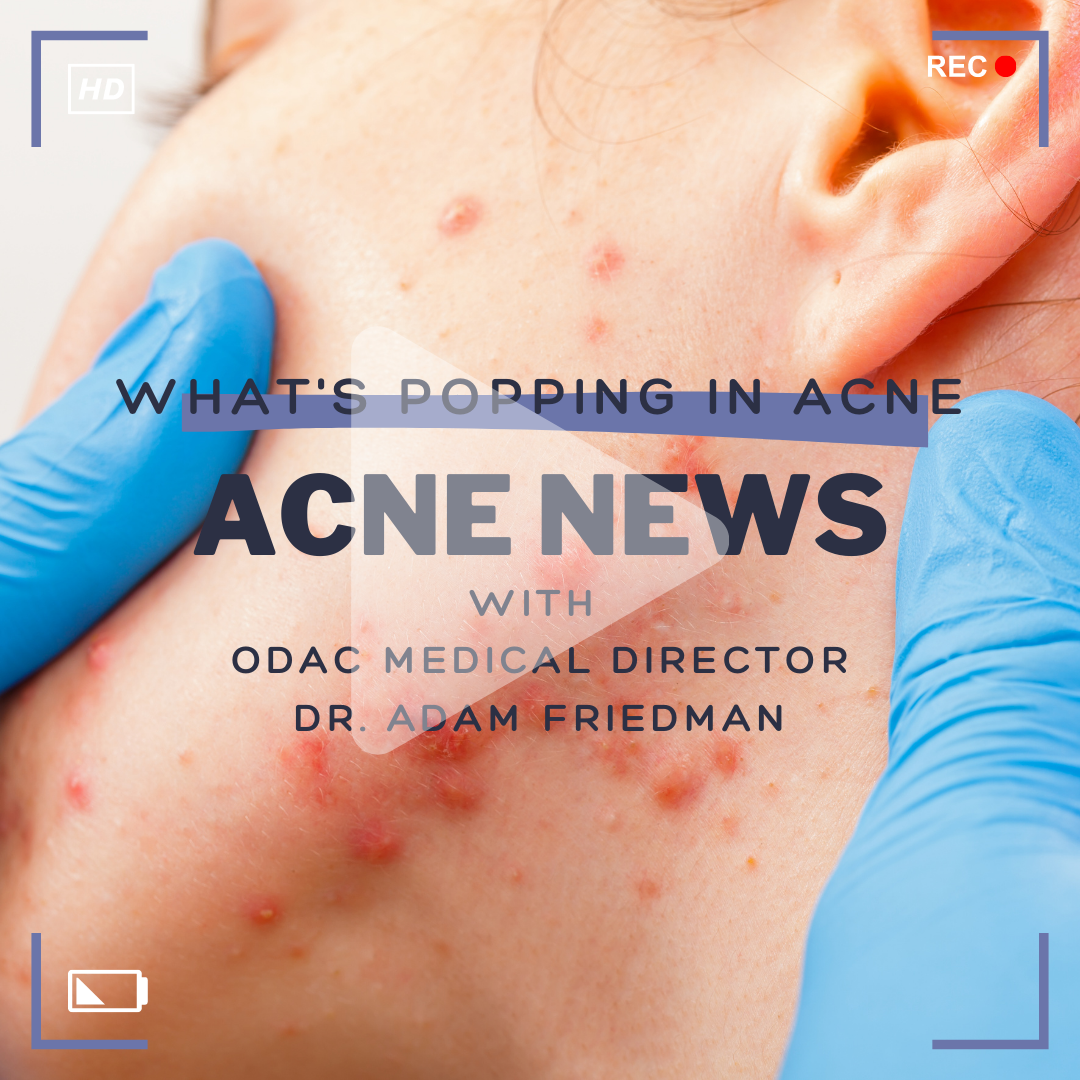Straight from the desk of ODAC Medical Director, Dr. Adam Friedman, we share what’s popping in acne (spoiler alert: quite a lot!). According to Dr. Friedman, the innovation drought is over! Watch as he reviews all new topical and oral therapeutics (some of which are completely new active agents) and while at it, shares and debunks important information related to the management of acne vulgaris as an inflammatory skin disease.
Further Reading
To learn more about the latest news on acne, check out the following articles published in the Journal of Drugs in Dermatology:
A Clinical Study Evaluating the Efficacy of Topical Bakuchiol (UP256) Cream on Facial Acne
Acne vulgaris is a common skin disease that manifests clinically as comedones, papules, nodules, and cysts. In this single-center, open-label pilot study (ISRCTN13992386), we aimed to evaluate the effectiveness of UP256 cream, a newly patented topical product containing 0.5% bakuchiol, on facial acne and acne-related post-inflammatory hyperpigmentation (PIH). A series of 13 subjects enriched for Fitzpatrick skin types III–VI with mild or moderate acne received treatment with UP256 twice daily for 12 weeks. Efficacy assessments included changes in inflammatory and non-inflammatory lesions as well as a reduction in Evaluator Global Severity Score (EGSS) assessments of acne severity and PIH. Safety, adverse events, and cutaneous tolerability were evaluated throughout the study. UP256 significantly reduced the number of inflammatory lesions and improved existing PIH. UP256 was also cosmetically acceptable and well tolerated by all study subjects. Overall, our results demonstrate that monotherapy with UP256 improves mild to moderate acne and may be particularly well suited for individuals with skin of color. Read the full article here.
J Drugs Dermatol. 2021;20(3): doi:10.36849/JDD.2021.5655
Tolerability and Efficacy of Clindamycin/Tretinoin versus Adapalene/Benzoyl Peroxide in the Treatment of Acne Vulgaris
Acne vulgaris is the most common dermatological disorder worldwide, causing significant physical and psychological morbidity. Topical combination therapy has shown superior efficacy compared to monotherapy, especially when combined with retinoids. Few studies have directly compared combined formulations. This evaluator-blinded pilot study compared the efficacy and tolerability of two marketed topical combination acne gels, clindamycin 1%-tretinoin 0.025% (CT) and benzoyl peroxide 2.5%-adapalene 0.1% (BA) in 20 patients with mild to moderate acne vulgaris. Gels were applied daily on opposite sides of the face for 21 days. The primary outcome was difference in transepidermal water loss (TEWL) at the end of treatment. Secondary endpoints were skin moisture content measurement, Investigators’ Global Assessment, subject self-assessments (SSA) of burning/stinging, itching, erythema, and dryness/scaling, and Comparative Participant Satisfaction Questionnaire (CPSQ). Efficacy was assessed by inflammatory and non- inflammatory acne efflorescences counts. TEWL increased significantly for both CT and BA (+57.74%, P=0.002; +58.77%, P<0.001); skin moisture content significantly decreased only for BA (-16.47%, P=0.02). Only BA showed a significant increase in erythema and dryness/scaling (P=0.027 and P=0.014) and in SSA burning/stinging (P=0.04). Patient satisfaction evaluation also reflected the strong BA irritation. Although CT and BA both reduced acne lesions (P<0.001) and more patients preferred to continue with CT, subject perception of acne improvement was higher for BA. These findings suggest that CT and BA have similar efficacy in the treatment of mild to moderate papulopustular acne. However, CT was better tolerated than BA by both medical and subject evaluation. CT is an effective and tolerated treatment option. Read the full article here.
J Drugs Dermatol. 2021;20(3): doi:10.36849/JDD.2021.5641
Differences in Depression and Distress Between Acne Patients on Isotretinoin vs Oral Antibiotics
Background: Little is known regarding differential effects of systemic anti-acne treatments on mental health.
Objective: To determine whether differences exist in mental health outcomes between acne patients treated with isotretinoin versus oral antibiotics (doxycycline, minocycline, or tetracycline).
Methods: Population study utilizing the 2004-2017 Medical Expenditure Panel Survey. Depressive symptoms were assessed using Patient Health Questionnaire 2 (PHQ-2); psychological distress was measured by the Kessler 6-Item Psychological Distress Scale (K6). Acne patients completed both the PHQ-2 and K6 during treatment with isotretinoin or oral antibiotics. Lower scores on both measures indicate better mental health outcomes.
Results: After adjusting for socio-demographic characteristics, patients on isotretinoin had fewer depressive symptoms than patients on oral antibiotics, as measured by mean PHQ-2 scores (isotretinoin 0.280 vs oral antibiotics 0.656, difference=0.337, P<0.01). The adjusted comparison also showed patients on isotretinoin had less psychological distress than patients on oral antibiotics, as measured by K6 scores (isotretinoin 2.494 vs oral antibiotics 3.433, difference=0.759, P=0.043).
Limitations: No direct assessment of acne severity.
Conclusion: Acne patients on isotretinoin experienced less depressive symptoms and psychological distress as compared to oral antibiotics. Read the full article here.
J Drugs Dermatol. 2021;20(2):172-177. doi:10.36849/JDD.2021.5559
Did you enjoy these video pearls? You can find more here.


